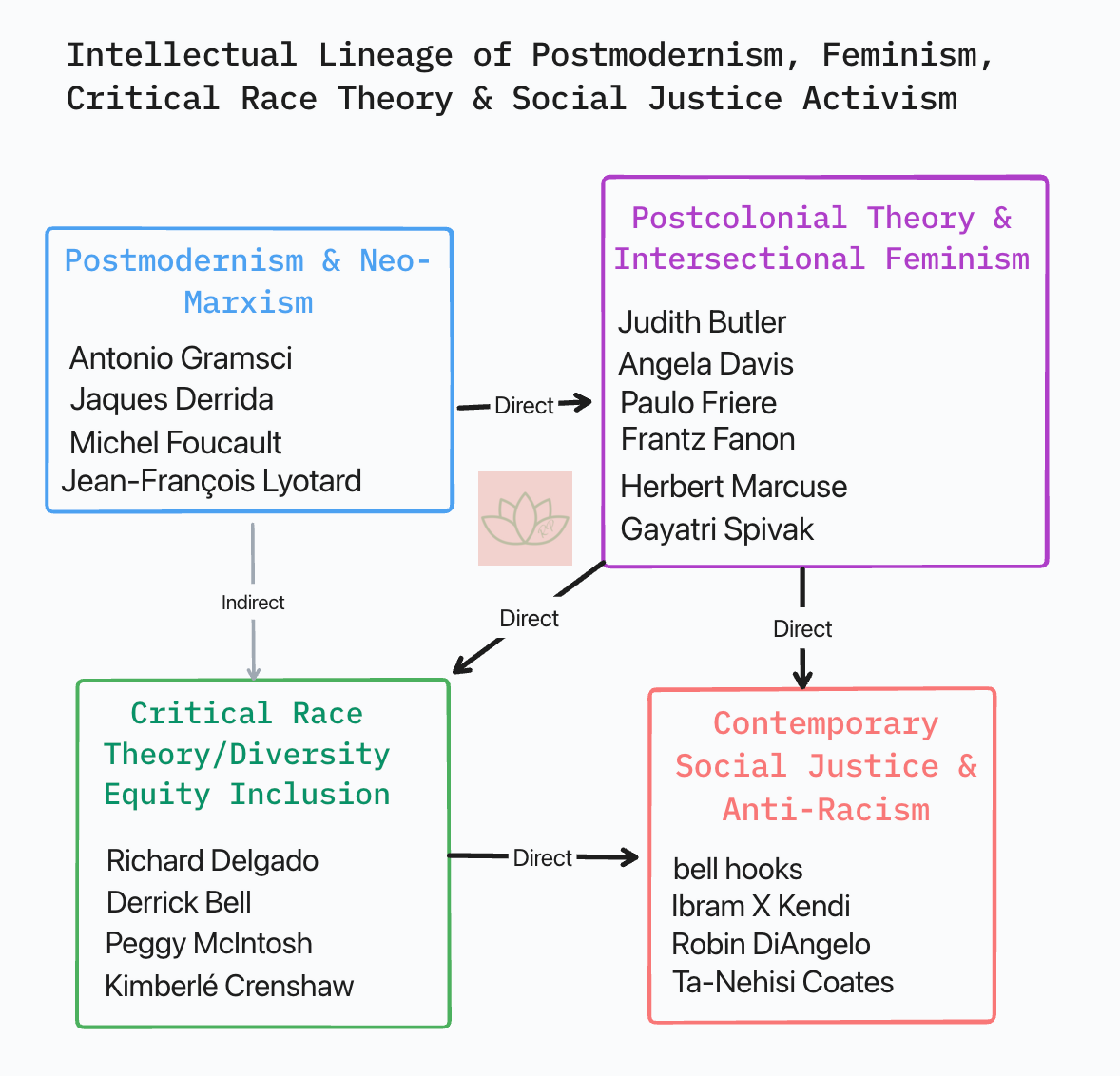Greetings, reader,
If you’re new here, I want to emphasize that I am not an anti-woke critic or reactionary. I write about other things, but this is just at the top of my mind. I am a former feminist who found the ideology to be psychologically harmful and rejected it so I could seize my mental health. Philosophy is the most excellent antidote to ideology. Those who have been around for a while, please know that I sincerely appreciate you.
Wokeness is a psychological disciplinary system, and it’s not dead. Further, managerial class feminism underpins the system and is deeply embedded in the female psyche. Feminism and social justice are the default lens for reality, much like reflexive anti-wokeism is the lens for the far right. The ‘defeat’ of wokeism obscures its enduring victory; social justice governs social and professional norms but is buried so deep that we forget it’s there. Wokeism has won, and Trump is the justification for doubling down on authoritarian norms. It’s just how we relate to each other now. I didn’t want Trump to win because the left now thinks they have the moral high ground when, in reality, no one does.
I keep seeing declarations, usually by men, that wokeness is defeated because Trump won and companies are rolling back DEI. That, however, is merely representative of an institutional waning of wokeness.
Feminism as the foundation of social justice
First, the core of what everyone calls wokeness is feminism. Think about the people you would categorize as woke, who come to mind as easily offended, or who employ social aggression disguised as moral action. If it’s not primarily women, I want to know who thinks of a bunch of dudes when they think of wokeness.
When people think of the theoretical foundations of wokeness, the terms ‘intersectionality’ and feminism come to mind. Here’s a diagram showing how postmodernism, neo-marxism, feminism, postcolonial theory, social justice, critical race theory, and DEI intersect. And yes, I have read almost all of them in graduate school and while doing Teach for America (a story for another time).
Wokeness lives because feminism lives, and it infects all my social spaces. You will no doubt want me to describe what I mean by feminism or wokeness in social spaces. This worldview is the default among women with degrees.1
Feminism as a social disciplinary system
Feminism is a system of rigid social discipline. Foucault described the control of post-Enlightenment institutions in terms of the panopticon, a prison designed to be more humane and encourage prisoners to police each other.
Feminist theorists later used the panopticon to be a metaphor for patriarchal institutions, but they became the prisoners and wardens themselves of the Mental Prison of Feminism.
Being a woman today means reciting a catechism of affirmations, pronoun rituals, moral posturing, conflict aversion, and social policing of Correct Thought. I reject feminism because I value my intellectual independence and psychological autonomy. No one is perfect, but we could at least not tell ourselves convenient lies about the world and our role in our life’s outcomes.
I say this, having once been an ardent devotee at the altar of grievance that is the Church of Feminism. Wokeism is merely the Protestant offshoot of that church. I went to both. Both churches are full of wealthy, connected people confident in their moral authority. There was ample mutual policing.
Feminism is a system of control spanning your self-conception to how you relate to others. I controlled myself when I was a feminist, in addition to everyone around me. I policed thought, morality, and behavior. I ended a nonzero amount of friendships over slights that I took to their most extreme interpretation, which is the behavior of the mentally ill, as I was at the time.
Foucault critiqued social systems as diffuse forms of control through which power is exercised on micro and macro scales. Power differentials, therefore, exist in every relationship, and the implication is that the exercise of power is always obviously done by the person appearing to have more social status. But being a victim is a source of social status today; I know because I once accrued it by playing up my victimhood.
‘Society’ is often blamed for ills by individuals like an amorphous force. Being raised by Indian-origin parents meant living by that dreaded question about your life choices: “But what will people say?”. In this question and the invocation of ‘society,’ we gloss over who judges. What is society? In my estimation, when people blame society, they are blaming women. That is, when women blame ‘society’ for their inability to do x, they’re naming each other as the oppressor. They think they’re complaining about men, but women are actually the wardens of the panopticon of feminist ideology.
Feminist epistemology applies Foucault’s theories of power and control to patriarchal structures. But I look around and only see women imposing Correct Thoughts and behavioral standards on each other. Feminism as a psychological system is a trojan horse for patriarchy. My exposure to Indian origin hierarchies and systems of social control at least shows me patriarchy in its direct form; in the American cultural context, feminism obscures what is really a historically contiguous system of social control. Women’s historic social control mechanisms just adapted and put on lipstick to appear empowered.
To that end, I will illustrate a scene I experienced in group therapy three days ago; I’ve been thinking about it since. I can’t remember the exact conversation, but the point is that everyone acted according to the feminist catechism. Others may identify the below as wokeness but recall that feminism is Mother Church, which I oft-visited. The people, however, turned on me, so here we are.
The Scene
I’m attending Interpersonal Process Therapy because I feel disconnected from humans due to my views. I should have expected what happened, but it was nevertheless jarring. Longtime readers know a few things about me: I had an often traumatic childhood (actual trauma), have been ostracized by girls and women throughout life, and have lost several friends because I stopped being woke.
The Cast
Priestess Vale, Moral Authority of the Marginalized, queer Latina
Dangerous Greg, Problematic White Male
Martyr Chris, White Male Ally2
Echo Chris, White Male Follower
Meera, the Gentle Enforcer, Indian-American female with curly hair and a nose ring (the universe likes fucking with me)
The Supplicant Ensemble, the choir of guilty white people
Scene: the group has just discussed various workplace woes. Meera asked Vale why she is down; Vale is always down and has self esteem issues. This is my third session, mind you, and in the second one, I came clean about why I was in the room at all: my inability to connect with people, given the massive gulf in worldview between myself and most of my peers in the managerial class. Greg, a man in his 70s with white hair, a slight beard, and a Texas drawl, has shared how the city forced him into early retirement because he had a conflict with a younger female colleague.
“Isn’t that behavior gendered, though?” I asked, thinking about the divergent ways men and women behave in the workplace.
“I’m agender; I’m going to slip into oblivion,” said Greg, chuckling softly. I presume this was him evading talking about it because he definitely thinks he was personally victimized by Regina George. Echo Chris echoes Greg’s joke and makes light of pronouns.
Some minutes later, after the conversation had moved on, Martyr Chris said, “I want to go back to Greg and Chris joking about gender. I’m annoyed at you, and it was offensive to Vale, who’s already struggling.” Martyr Chris has white hair but the energy of a man trying to be younger than he is.
Vale, now that she’s gotten the courage to speak up from Martyr Chris, “This room is majority white and male, and you all have privilege.”
Uncomfortable silence.
Vale continues, “In most rooms in Austin, we state our pronouns at the beginning, and we didn’t do that here.” Looking at Stuart, the group leader, Vale chastises him for not asking everyone to state their pronouns when a new person enters the group. No person preferring they/them was present to be offended. It wasn’t even about race but about pronouns. She is upset and offended in her tone, and Martyr Chris has given her something new to focus on.
The Supplicant Ensemble sang the verses of redemption, talking about how they’re afraid to say the wrong thing but want marginalized people to know they’re ‘safe.’ They spoke of their childlike innocence about gender and pledged to do better for Vale. Vale assured them that no one would get angry at them for doing or saying something wrong, at which moment I suppressed a snort. This conversation about the morality of pronouns lasted for forty-five minutes while I stared into my lap, feeling deeply uncomfortable. Echo Chris chastised Greg for being passive-aggressive in one of his responses to make clear that he’s not dangerous.
I eventually spoke up and said that they’d created a situation where there was a correct and morally incorrect position. Anyone who disagreed with the pronoun ritual in this room would be morally tainted. If non-Democrats were in the room, they’d be too uncomfortable to speak up about their disagreement. They’ve created an environment in which people are morally sorted by their views, and now Greg and I are on one side, and everyone else is on the other. Can they tolerate disagreement on this subject, I asked? I explained again that I had lost friends after moving away from wokeness.
Meera tried to keep the peace and asked if I would respect someone who wanted to use they/them pronouns, trying to see if I was ‘reasonable’ or a threat. I said I would respect the request but disagree with the pronoun ritual and consider it authoritarian. The session ended before Vale could respond, but now I know that this conversation will be entirely eaten up next week.
I will give you the details of the above incident to illustrate that wokeness began in the psyche as a method of self-understanding and jumped to institutions, not the opposite. And so, we don’t see it governing us because it’s not merely an ideology or a set of beliefs but a lens for reality and the self. Everyone played their part in the catechism perfectly.
Thus, wokeness ending would have to mean that professional-class women have decided to seize their agency from a disempowering worldview and no longer blame white men for all problems. That won’t happen; too much of our sense of self is tied up in these ideologies. I know because I had to basically kill my former self and build her back up from the ground.
People with degrees also span the class spectrum, and it exists among most of them.
Yes, my ex-spouse’s name is Chris. Yes, I dislike ‘husband.’








Can I just say that I love that we published something about feminism based rhetoric/behaviour within minutes of each other and also prefaced our pieces with "I'm not an anti- fill-in-the-blank" as pre-emptive defence against the whatabouters who are ready to pounce. Thank you for your voice, bravery, and clarity.
The Male Woke is often just Nice Guy 2.0 "if I loudly demonstrate allyship at all times and act utterly unthreatening and ingratiating, maybe some woman will grant me entrance to her vazheen..."
This can quickly turn into its less unassuming variant "I was an ally and so now You Owe Me!"